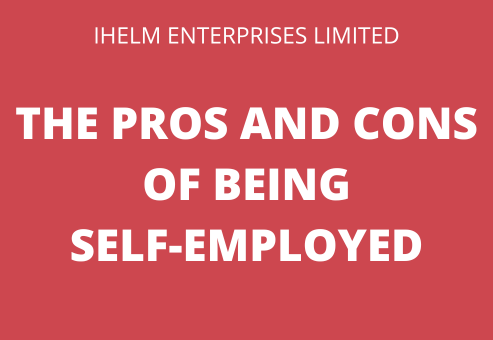During April’s Facebook Live, I talked about the pros and cons of being self-employed in the UK.
In recent years, self-employment has been on the rise globally, and the United Kingdom is no exception. With the advent of the gig economy and technological advancements enabling remote work, more people are opting to become their own bosses. However, like any career path, self-employment comes with its own set of advantages and disadvantages. Let’s delve into the pros and cons of being self-employed in the UK.
Pros:
1. Flexibility: One of the most attractive aspects of self-employment is the flexibility it offers. You have the freedom to set your own hours, choose your clients, and work from any location with an internet connection. This flexibility allows you to balance work with personal commitments, such as childcare or pursuing hobbies.
2. Control: As a self-employed individual, you have full control over your business decisions. You can determine your pricing, choose the projects you want to work on and set your business goals according to your vision. This autonomy can be empowering and fulfilling, as you are responsible for your own success.
3. Tax Benefits: Self-employed individuals in the UK can take advantage of various tax deductions and allowances not available to employees. These include deducting business expenses such as equipment, travel, and professional fees, as well as claiming tax relief on pension contributions. Additionally, you may be eligible for the Flat Rate Scheme or the Annual Investment Allowance, reducing your overall tax liability.
4. Potential for Higher Earnings: While income can fluctuate in self-employment, successful entrepreneurs and freelancers have the potential to earn more than their employed counterparts. By building a strong client base, delivering quality work, and continuously improving skills, self-employed individuals can command higher rates for their services and increase their earning potential over time.
5. Diverse Opportunities: Self-employment opens doors to a wide range of opportunities across industries and sectors. Whether you’re a graphic designer, writer, consultant, or tradesperson, there is a market for your skills and services. This diversity allows you to explore different avenues and find the niche that best suits your talents and interests.
Cons:
1. Irregular Income: One of the biggest challenges of self-employment is the irregularity of income. Unlike traditional employment with a fixed salary, self-employed individuals may experience fluctuations in earnings due to factors such as seasonality, market demand, and project delays. This inconsistency can make budgeting and financial planning more challenging.
2. No Guaranteed Benefits: Unlike employees, self-employed individuals do not receive benefits such as paid sick leave, holiday pay, or employer pension contributions. You are responsible for managing your own insurance, retirement savings, and other benefits, which can add to your financial responsibilities and require careful planning.
3. Administrative Burden: Running a business as a self-employed individual entails administrative tasks such as bookkeeping, invoicing, and tax compliance. Without the support of an HR department or accounting team, you must handle these responsibilities yourself or invest in professional services, which can consume time and resources.
4. Isolation: Working for yourself can be isolating, especially if you primarily work from home. Without colleagues or a traditional office environment, you may miss out on social interactions, collaboration opportunities, and networking events. Maintaining a healthy work-life balance and combating feelings of loneliness requires proactive effort and seeking out community support.
5. Uncertain Future: Self-employment can be inherently risky, as your success is dependent on market conditions, client demand, and your ability to adapt to change. Economic downturns, industry shifts, or personal circumstances can impact your business viability and financial stability. It’s essential to have contingency plans in place and continuously evaluate and adjust your business strategy to mitigate risks.
In conclusion, self-employment in the UK offers numerous benefits, including flexibility, control, tax advantages, and diverse opportunities. However, it also comes with challenges such as irregular income, lack of guaranteed benefits, administrative burdens, isolation, and uncertainty. Whether self-employment is the right path for you depends on your individual goals, preferences, and risk tolerance. By carefully weighing the pros and cons and planning accordingly, you can navigate the self-employment journey successfully and achieve your professional aspirations.
If you have any questions about becoming self-employed in the UK, please feel free to e-mail me.

